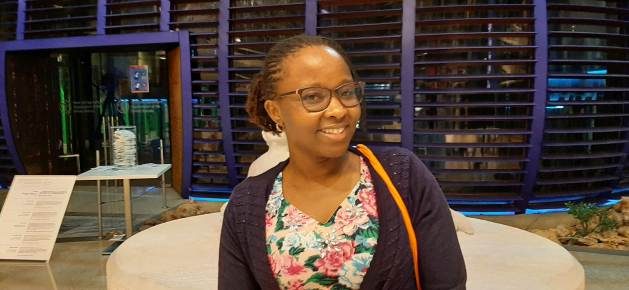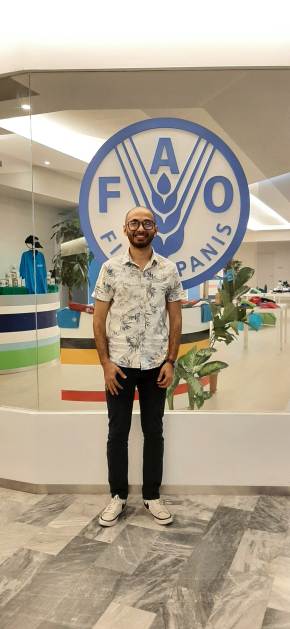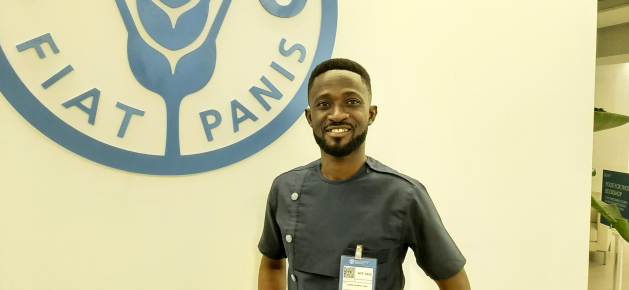Farm-Kids-Turned-Scientists Give Back on the Climate-Crisis Front Line

ROME, Oct 31 (IPS) - Dr Alice Karanja knows from personal experience the tough choices the climate crisis is putting people before in the Global South. Choices such as whether to have a healthy diet or give your children an education. Choices such as whether to go hungry or allow your children to have any schooling at all.
Having grown up on a small farm in Kenya, Karanja’s family made those tough calls and the huge sacrifices necessary to enable her to go all the way in education, obtaining a PhD in Sustainability Science from the University of Tokyo, Japan.
“I grew up on the slopes of Mount Kenya to a smallholder farming family,” Karanja told IPS at the recent World Food Forum at the Rome headquarters of the United Nations Food and Agriculture Organization (FAO).
“Both my parents are small-scale farmers. My motivation for my work is inspired by what I saw when I was growing up.
“I observed my parents and how they were affected, and still are affected, by climate change in terms of extreme weather patterns, prolonged droughts, inconsistent rainfall patterns.
“The income that they got from their farms sometimes was mostly used to support us with education or health, while the expectation was that we could diversify our diets at home.
“In Africa one of the issues that is affecting us regards the limited set of crops that are grown, mostly maize, wheat and rice. So when people grow maize, they expect then to get some income to get some vegetables or fruit to include in their diets. But often, because of climate change, that money can only be channeled to other needs of the household.”
Karanja is now using her skills to help people just like her parents.
She is a post-doctoral research fellow at the World Agroforestry Center (ICRAF) in Nairobi, Kenya, where her research focuses on restoration of agricultural landscapes based on regenerative agriculture for biodiverse, inclusive, safe, and resilient food systems.
She also plans to pilot food-tree portfolios in Zambia to help smallholder families obtain year-round access to nutritious foods, diversify their incomes, and boost their resilience to increased food prices and climate change.
“Most of my work is at the intersection of resilience to climate change in terms of livelihoods, food security and conservation and the use of agro-biodiversity for improved diets,” Karanja said.
“For the past two years in my work at ICRAF, I have been looking at the role of agricultural biodiversity and the interplay it has with dietary diversification, also looking at how this interplay affects nutritional status, especially for women and children”.
Many other experts selected to take part in the Young Scientists Cohort (YSG) at the World Food Forum had similar stories.
Ram Neupane decided to study agriculture after being born on a small family farm in Gorkha, Nepal, and seeing the economic and psychological implications of devastating plant diseases.

“Climate change is a tentacular threat to all aspects (of life) and plant health is affected too,” Neupane, who is pursuing a dual-title doctorate in plant pathology at Penn State University in the United States thanks to a scholarship, told IPS.
“Novel pathogens and viruses are emerging right now because of climate change. I am from one of the more rural parts of Nepal. I was raised in a farming family, so I have first-hand experience of the impact on the farming community there. For example, in my village, the main crop is rice and most of the rice is rain fed."
“When there is rainfall, farmers plant their rice. Due to climate change there has been irregularities in the timing and frequency of rainfall and this is affecting planting times.
“This, in turn, affects the whole cropping system.
“This has led to flows of people going from more rural areas to urban areas because farming is no longer profitable”.
Dr. Peter Asare-Nuamah, a lecturer at the University of Environment and Sustainable Development, Ghana, employs his quantitative and qualitative research skills and experience to offer solution-oriented contributions to issues of climate change, food security, adaptation and environmental management, particularly in smallholder agriculture systems in developing economies.
“I chose this (career path) because of what I saw about climate change,” Asare-Nuamah told IPS.
“I work within the context of climate change and smallholder agriculture systems.
“I was born in a rural farming community where we engage in cocoa, cassava and other food crops, and you could see the impact of climate change.
“At the time the conversation about the impact of climate change was not so high, it had to do with high political level discussions, and I thought there was a need to engage individuals in the conversation on how to address climate change.
“People from my community are suffering. They plant (crops) and because of the absence of rainfall, the plants do not ripen. Even if they ripen, they give very low yields.
“There are pests and disease all over the world and in Ghana we are currently suffering with fall armyworm, which has arrived because of climate change and is having devastating consequences.
“Smallerholder farmers feed a lot of the population of the African continent but they have not been able to push themselves out of poverty and they continue to struggle.

Education is an issue. Basic necessities are also an issue.
“So all this combines to put them in a position where they are highly vulnerable.
“Even though African economies contribute less than 3% to global carbon emissions, the impact is so high in this part of the continent.
“This calls for the need to address climate change, how developed economies, which have contributed so much to climate change, can come together and help smallholder farmers and developing economies to mitigate some of the challenges caused by the actions and inactions of some of the developed economies.
“So these are the issues that drove me personally to go into the climate change arena, so I can contribute to making sure that we have solutions for smallholder farmers, we have conversations, we have financing, and we are able to build the capacities of smallholder farmers”.
© Inter Press Service (2022) — All Rights Reserved. Original source: Inter Press Service
 Global Issues
Global Issues